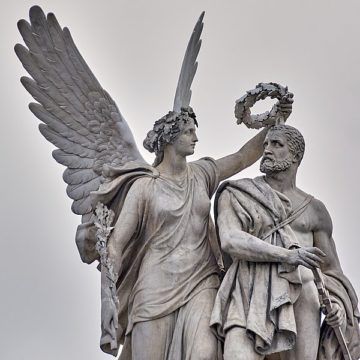by Christopher Horner
When the legend becomes fact, print the legend. —The Man Who Shot Liberty Valance (dir. John Ford)
No man is a hero to his valet. —proverb
The highest act of reason…is an aesthetic act. —Holderlin (attrib)

Sometimes it seems that growing up and learning things is one long process of disillusionment. Dis-illusion: we shed illusion, fantasy and myth, and so we disenchant the world. Somehow this is both a good and a bad thing. Good, because we cannot, must not, live on lies; bad because we cannot live on facts alone.
There are plenty of people ready to feed us lies, and plenty who want to believe them: about American Exceptionalism, about race, about the economy – about how global warming is nothing to worry about, when in fact it threatens our very lives. We really do need to find out what is happening and and how it came to be. In the UK, for instance, there seems to be the widespread vague sense that the empire was a sort of outdoor relief programme, all about building railways and schools for the lucky natives, and not at all about exploitation and oppression. So who are all these brown skinned people and what have they to do with us? In the USA we have seen the effects of nurturing lies about race and nation, lies that go all the way back to the the founding: the denial of a history of slavery, genocide and subjugation. And our heroes have feet of clay: Gandhi, Wollstonecraft, Lincoln, Churchill, Jefferson, all were flawed. Indeed, the last three in that list can be indicted of racism. And because of their actions, people died.
And yet there is more to be said about myth, legend and facts. Sometimes the facts can lead us towards error, and the myth can convey something true, as when an event or person inspires us to reach for something higher and better. Moreover, the desire to debunk and find the dirty laundry can generate its own smell: it can be motivated less by a desire to get at the truth than what Nietzsche called ressentiment: half suppressed feelings of hatred and envy that find a brief satisfaction in bringing down anything noble or good. Sometimes, too, something of the truth is to be grasped in the very illusion it engenders – as Hegel says, appearances both conceal and reveal the essential thing. Let me try to explain with some examples. Read more »
